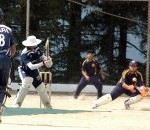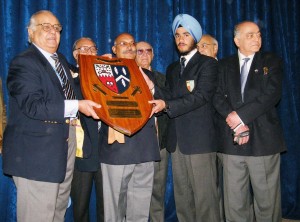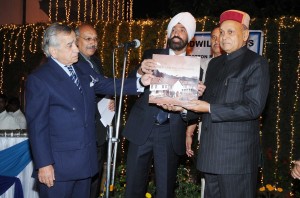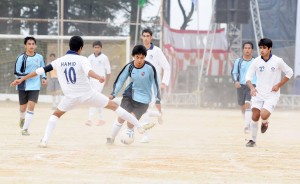
Shimla: Relations among colonial cousins India and Pakistan may be suffering for lack of confidence between the two nations after the 26/11 terrorist attack on Mumbai, but the picture is not all gloomy elsewhere.
The Sesquicentennial jubilee (150th in 2009) celebrations of Bishop Cotton School- the Oldest Public School in Asia, having been found in 1859, witnessed the arrival of guests from across the border.

“Earlier, it used to take a two-day journey to reach Shimla. And, though we missed home for a few days, after a week the school was our home. Ever since I have stepped inside the school gate two days ago, that feeling has returnedâ€, said an emotional Khan.
Headmaster of Bishop Cotton R C Robinson said the ceremony was also symbolic of the need to keep Indo-Pak ties on good terms and our hearts open. To commemorate this historic occasion, a series of events took place from October 2-6, 2009. These historic anniversaries are especially significant for an institution that has enjoyed a character and status unique in this country.


A bunch of septuagenarian Old Cottanians, including Rajinder Singh Gupta, Behram, Daljeet Singh and Samarjeet Singh, who came in from as far as Switzerland, Germany and United Kingdom, said they enjoyed the excitement. Some prominent names who partook in the celebrations were, Ashok & Sunil Advani, AK Mehra, Theatre artiste and Director Benjamin Gilani, Industrialist D.C. Anand, Anil Bhasin, Nakul Anand, Actor Kumar Gaurav, Raja Awasthi and many more.
Famous Pakistani pop-singer Adnan Sami enlivened the atmosphere with a spellbinding musical performance on 4th of October. The 6-day long celebrations concluded with the launch of Bishop Cotton School (BSC) India stamp.
History & Heritage
Bishop Cotton School, Shimla, is one of the oldest Public Schools in Asia, having been founded on 28 July 1859 by The Bishop George Edward Lynch Cotton, son of an Army Captain, who died leading his Regiment in battle. A scholar of Westminster and a graduate of Cambridge, in 1836 he was appointed as an assistant master at Rugby by Doctor Thomas Arnold, one of the founders of the British Public School System. It was the young Mr. Cotton who is spoken of as “the model young master†in Thomas Hughes’ famous book “Tom Brown’s School Days†which gives an insight to school life at Rugby.

After having taught for 15 years at Rugby, in 1852 he was selected to be the Headmaster of Marlborough, where he establishes organised games and House and prefect systems. He believed that “The prefects are and shall be, long as I am the head, the governors of the school. As soon as I see this impracticable I will resign…†He was consecrated Bishop at Westminster Abbey by the Archbishop of Canterbury. Queen Victoria personally selected Bishop Cotton as Bishop of Calcutta and Metropolitan Bishop of India, Burma and Island of Ceylon, keeping in view the critical period in India.

In 1937 a Prep School was opened by buying the Ayrclif Girls School (now the Tibetan School in Chotta Shimla) for Rs. 35,000/-. In December 1947 the prep school was closed as 42 Pakistani and 98 British and European boys left India and the school. The prep school was finally sold in 1961, to the Dalai Lama having been on rent to the government from 1948. The first Indian boy permitted to join the school was Suren Tagore in 1881 and Vishnu Singh in 1883.

The four Pre-Independence Indian School Captains were R.J. Gandhi in 1928, Harry Chukerbuti in 1936, Jahengzeb Khan in 1941 & Hasan Agha in 1946-47.
The school has an unbroken history since 1859 and by the statues of the school; the former Viceroys and the Presidents are the visitors of the School. In 1989, the President of India was the Chief Guest at the Founder’s Day Celebration. A School is judged by its products. The school has produced Ambassadors, UN Contingent Commanders, Politicians, M.P.’s in England and India, about a dozen Generals/ Admirals/ Air Marshals, leading Industrialists, Authors, A Chief Minister, Secretaries and an Air Chief. Cottonians have donned the Indian colours in Golf, won a gold Medal in National Taekwando, broken the national broad jump record, represented England and Malaysia in Hockey and Malaysia in cricket, won the second highest Indian decoration in war and have been knighted and produced the most decorated officer in the history of all Armies (Maj. R. Farran) Cottonians have also made the supreme sacrifice in defense of their Country.
Eminent OCs of BCS:
Jigme Dorji, King of Bhutan (Rivaz 1936-38)
Palden Thondup Namgyal, Chogyal/King of Sikkim, (Lefroy 1933-42)
Justice H.S. Bedi, Supreme Court of India (Curzon 1954-62)
Air Chief Marshal P.C Lal, Padma Vibhushan, DFC, CAS (1927-29)
General Akhtar Abdur Rahman, military governor of Baluchistan and head of Inter-Services Intelligence, Pakistan
Simranjit Singh Mann, MP, Punjab (Ibbetson 1951-61)
D.C. Anand, Industrialist
Major Roy Farran, MLA, Minister of Utilities and Telephone, Canada (Curzon 1932-34)
Major Roy Farran was the highest decorated military soldier in the world. He passed away in 2006 in Canada.
http://en.wikipedia.org/wiki/Roy_Farran
http://www.guardian.co.uk/news/2006/jun/12/guardianobituaries.secondworldwar
Fali Nariman, Legal Luminary, Senior Advocate Supreme Court of India, MP (Rajya Sabha), Padma Bhushan (Ibbetson 1942-44) –
Virbhadra Singh, Former Chief Minister of Himachal Pradesh. He holds the distinction of second longest serving Chief Minister in India after Jyoti Basu.
Felix Rossetti, Poet (1899-1909)
Melville F O’ De Mellow, Padma Shri, Broadcaster (Ibbetson 1925-29)
Ruskin Bond, Padma Shri, Author (Ibbetson 43-50) –
Tarsem Singh Dhandwar, Hollywood Director, (Ibbetson 1972 -78). He is one of the highest paid directors in Hollywood. Tarsem’s feature film directorial debut was The Cell (2000), starringJennifer Lopez. His second film, The Fall, debuted at the 2006 Toronto International Film Festival and was released theatrically in the United States in 2008.
Jeev Milkha Singh: Last year’s Top Asian Golfer and son of flying sikh Milkha Singh. –
Arjun Atwal: One of India’s top Indian golfer.
Benjamin Gilani: Theatre artiste and director –
Lt Gen N C Rawlley, PVSM, AVSM, MC. He retired as Vice Chief of Army Staff.





